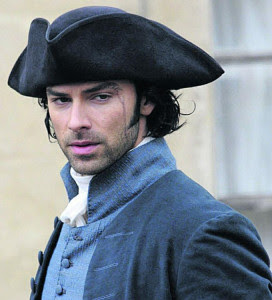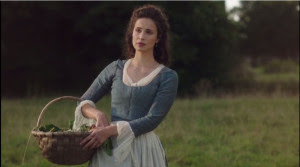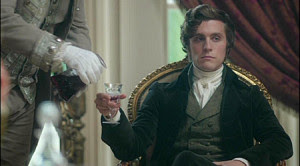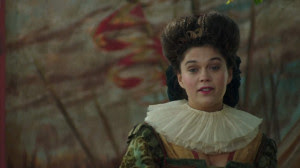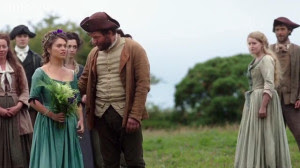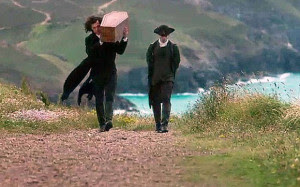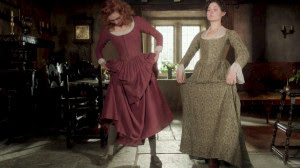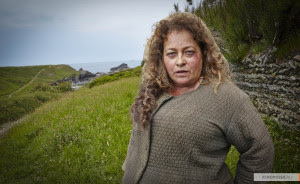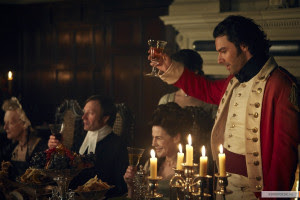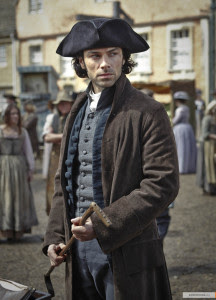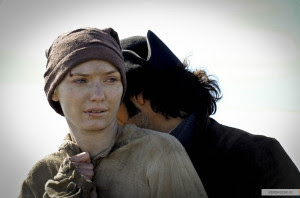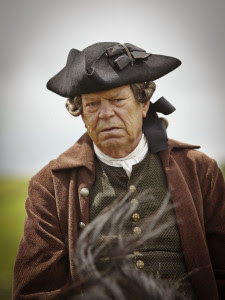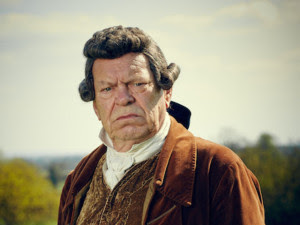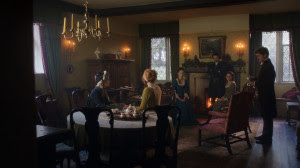 ”PERSUASION” (1995) ReviewTwenty-four years after the BBC aired its 1971 version of Jane Austen’s 1818 novel, ”Persuasion”; and twelve years before ITV aired its adaptation; Columbia Pictures released its own version on British television and in movie theaters across the U.S. The movie went on to become highly acclaimed, the winner of a BAFTA TV award for Best Single Drama, and regarded as the definitive version of Austen’s novel. Directed by Roger Michell, ”PERSUASION” told the story of Anne Elliot, the middle daughter of an impoverished baronet in Regency England. Seven or eight years before the story began, she had been persuaded to reject the marriage proposal of a young and ambitious Royal Navy officer named Frederick Wentworth by her godmother and late mother’s friend, Lady Russell. After spending so many years in deep regret over her action, Anne found herself facing Wentworth again during a visit to her younger sister’s home. Now a captain and wealthy from the spoils of the recent Napoleonic Wars, Wentworth continued to harbor a good deal of residual anger and resentment toward Anne. And the latter continued to harbor remorse over her actions and a passionate love for the naval officer.After watching the 2007 version of ”PERSUASION”, I found myself wondering how I would regard this particular version. Needless to say, I found it very satisfying. Michell did an excellent job in capturing the ambivalence of Austen’s novel. The center of that ambivalence rested on the underlying passion of Anne Elliot and Frederick Wentworth’s romantic history. And this passion beautifully permeated the movie; thanks to Michell, screenwriter Nick Dear and the two leads – Amanda Root and Ciarán Hinds. The movie relived all of the passion and emotions of their relationship – both positive and negative. Michell and Dear also did a top-notch job in revealing the initial dangers that the British aristocracy and landed gentry faced from their complacency, arrogance and unwillingness to match the ambitious endeavors of the rising middle-class; especially through characters like Anne’s father, Sir Walter Elliot.As much as I had enjoyed ”PERSUASION”, I believe it had its flaws. One of those flaws turned out to be the scene featuring Anne and Wentworth’s final reconciliation on one of the streets of Bath. It could have been a wonderful and poignant moment . . . if it were not for the circus performers and pedestrians making a ruckus in the background. It nearly spoiled the romantic mood for me. And there were at least two performances that did not sit right with me. I will discuss them later. This version of ”PERSUASION” seemed to be the only adaptation that portrayed Mrs. Croft as the younger sister. Fiona Shaw, who is at least five years younger than Ciarán Hinds and looked it even with minimal makeup, portrayed his sister. Yet, both the 1971 and 2007 versions had cast an actress that was older than the actor portraying Wentworth. And I happened to know for a fact that at age 31, the Fredrick Wentworth character is at least seven (7) years younger than his sister. There is no way that the 42 year-old Hinds could have passed as a man eleven (11) younger, despite his handsome looks.But my main problem with this adaptation turned out to be the same problem I had with the 2007 version – namely the character of William Elliot, Sir Walter’s heir presumptive. Because the baronet had no male issue, his baronetcy and the Kellynch estate will pass to William, his cousin. But William, fearing that Sir Walter might marry Mrs. Clay, the companion of the oldest Elliot daughter; schemed to woo and marry Anne in order to prevent Mrs. Clay from becoming Sir Walter’s second wife and protect his inheritance. As I had explained in my review of the 2007 version, this scenario failed to make any sense to me. Even if William had succeeded in preventing any marriage between Sir Walter and Mrs. Clay, there was no way he could constantly prevent the Elliot patriarch from considering another bride for matrimony. Even if he had married Anne. Quite frankly, it was a situation that was beyond his control. Dear tried to give urgency to William’s situation by portraying him as financially broke after spending all of his late wife’s money. As far as I am concerned, Dear’s efforts failed. Sir Walter’s lawyer had made it clear around the beginning of the story that it would take years for Kellynch to recover from the Elliots’ debts. Nor did following Austen’s story by making William and Wentworth romantic rivals for Anne’s affections really help. Anne did not seem that impressed by William’s character, despite his charm and wit. And if Dear had simply avoided Austen’s characterization of William Elliot and allowed him to retain his fortune; he could have been a formidable rival for Wentworth, just as Louisa Musgrove proved to be a strong rival for Anne in the story's first half.I cannot deny that ”PERSUASION” strongly benefited from the excellent performances of the two leads, Amanda Root and Ciarán Hinds. Root was superb as a sad and remorseful woman who began to bloom again over the possibility of a renewed love. With very little dialogue, she was excellent in a montage that featured her character’s reaction to the Musgroves’ carping over Anne’s younger sister, Mary Musgrove. But my favorite scene happened to featured Anne and Wentworth’s first meeting after eight years at Charles and Mary Musgrove’s cottage. With her eyes and body language, Root conveyed Anne’s series of emotions from seeing the naval officer again after so many years with great skill. Despite being a decade older than his character, Ciarán Hinds was equally impressive as Captain Frederick Wentworth, the successful Royal Navy officer who tried to hide his continuing resentment toward Anne’s rejection of him with a hearty manner and friendly overtures toward the Musgrove sisters – Louisa and Henrietta. One particular scene that impressed me featured Wentworth’s recollection of the year 1806 (the year Anne had rejected his marriage proposal). Hinds skillfully conveyed the character’s lingering resentment . . . and love for Anne in what struck me as a subtle moment.Other excellent performances came from Sophie Thompson, who did a top-notch job as Anne’s younger sister, the emotionally clinging Mary Elliot Musgrove; Simon Russell Beale as Charles Musgrove, Mary’s consistently exasperated husband; Fiona Shaw, who wonderfully conveyed Sophia Wentworth Croft’s strong mind, along with her love for her husband and her role as a naval officer’s wife in a charming scene; and Susan Fleetwood, who have a complex performance in her last role as Anne’s well-meaning, yet prejudiced godmother, Lady Russell. But the one supporting performance that really impressed me came from Samuel West’s portrayal of the conniving William Elliot. He gave a deliciously smooth performance that radiated wit and charm. I found him so likeable that I almost felt sorry for him when Anne finally announced her engagement to Wentworth. Unfortunately, not all of the performances impressed me. Despite my admiration for the late Corin Redgrave’s skills as an actor, I must admit that I found his portrayal of Anne’s narcissist and arrogant father, Sir Walter Elliot, a little off-putting. I realize that the character happened to be one of the outrageous characters in the novel. Unfortunately, Redgrave’s portrayal of Sir Walter’s narcissism seemed a little too mannered and broad. But Redgrave’s Sir Walter seemed like a mild annoyance in compare to Phoebe Nicholls’ portrayal of the eldest Elliot sibling, Elizabeth. Nicholls portrayed the character as an over-the-top diva suffering from a damaged nervous system. I could not help but wonder if she had been on crack during the production. Or perhaps Michell was on crack for allowing such a performance to remain in the film. And why did Dear's script include a complaint from Nicholls' Elizabeth about Anne usurping Wentworth's attention? Why was she even upset over the news regarding Anne's engagement? I do not recall her ever being interested in Wentworth.Overall, ”PERSUASION” was an excellent adaptation of Jane Austen’s novel. Amanda Root and Ciarán Hinds’ performances, Nick Dear’s screenplay and Roger Michell’s direction infused the movie with a mature passion rarely touched upon in the adaptation of Austen’s other novels. Does this mean that I regard this movie as the best adaptation of Austen’s 1818 novel? No. Like the 2007 version, it had a number of flaws that prevented it from becoming "the" best. But I must admit that it is pretty damn good.
”PERSUASION” (1995) ReviewTwenty-four years after the BBC aired its 1971 version of Jane Austen’s 1818 novel, ”Persuasion”; and twelve years before ITV aired its adaptation; Columbia Pictures released its own version on British television and in movie theaters across the U.S. The movie went on to become highly acclaimed, the winner of a BAFTA TV award for Best Single Drama, and regarded as the definitive version of Austen’s novel. Directed by Roger Michell, ”PERSUASION” told the story of Anne Elliot, the middle daughter of an impoverished baronet in Regency England. Seven or eight years before the story began, she had been persuaded to reject the marriage proposal of a young and ambitious Royal Navy officer named Frederick Wentworth by her godmother and late mother’s friend, Lady Russell. After spending so many years in deep regret over her action, Anne found herself facing Wentworth again during a visit to her younger sister’s home. Now a captain and wealthy from the spoils of the recent Napoleonic Wars, Wentworth continued to harbor a good deal of residual anger and resentment toward Anne. And the latter continued to harbor remorse over her actions and a passionate love for the naval officer.After watching the 2007 version of ”PERSUASION”, I found myself wondering how I would regard this particular version. Needless to say, I found it very satisfying. Michell did an excellent job in capturing the ambivalence of Austen’s novel. The center of that ambivalence rested on the underlying passion of Anne Elliot and Frederick Wentworth’s romantic history. And this passion beautifully permeated the movie; thanks to Michell, screenwriter Nick Dear and the two leads – Amanda Root and Ciarán Hinds. The movie relived all of the passion and emotions of their relationship – both positive and negative. Michell and Dear also did a top-notch job in revealing the initial dangers that the British aristocracy and landed gentry faced from their complacency, arrogance and unwillingness to match the ambitious endeavors of the rising middle-class; especially through characters like Anne’s father, Sir Walter Elliot.As much as I had enjoyed ”PERSUASION”, I believe it had its flaws. One of those flaws turned out to be the scene featuring Anne and Wentworth’s final reconciliation on one of the streets of Bath. It could have been a wonderful and poignant moment . . . if it were not for the circus performers and pedestrians making a ruckus in the background. It nearly spoiled the romantic mood for me. And there were at least two performances that did not sit right with me. I will discuss them later. This version of ”PERSUASION” seemed to be the only adaptation that portrayed Mrs. Croft as the younger sister. Fiona Shaw, who is at least five years younger than Ciarán Hinds and looked it even with minimal makeup, portrayed his sister. Yet, both the 1971 and 2007 versions had cast an actress that was older than the actor portraying Wentworth. And I happened to know for a fact that at age 31, the Fredrick Wentworth character is at least seven (7) years younger than his sister. There is no way that the 42 year-old Hinds could have passed as a man eleven (11) younger, despite his handsome looks.But my main problem with this adaptation turned out to be the same problem I had with the 2007 version – namely the character of William Elliot, Sir Walter’s heir presumptive. Because the baronet had no male issue, his baronetcy and the Kellynch estate will pass to William, his cousin. But William, fearing that Sir Walter might marry Mrs. Clay, the companion of the oldest Elliot daughter; schemed to woo and marry Anne in order to prevent Mrs. Clay from becoming Sir Walter’s second wife and protect his inheritance. As I had explained in my review of the 2007 version, this scenario failed to make any sense to me. Even if William had succeeded in preventing any marriage between Sir Walter and Mrs. Clay, there was no way he could constantly prevent the Elliot patriarch from considering another bride for matrimony. Even if he had married Anne. Quite frankly, it was a situation that was beyond his control. Dear tried to give urgency to William’s situation by portraying him as financially broke after spending all of his late wife’s money. As far as I am concerned, Dear’s efforts failed. Sir Walter’s lawyer had made it clear around the beginning of the story that it would take years for Kellynch to recover from the Elliots’ debts. Nor did following Austen’s story by making William and Wentworth romantic rivals for Anne’s affections really help. Anne did not seem that impressed by William’s character, despite his charm and wit. And if Dear had simply avoided Austen’s characterization of William Elliot and allowed him to retain his fortune; he could have been a formidable rival for Wentworth, just as Louisa Musgrove proved to be a strong rival for Anne in the story's first half.I cannot deny that ”PERSUASION” strongly benefited from the excellent performances of the two leads, Amanda Root and Ciarán Hinds. Root was superb as a sad and remorseful woman who began to bloom again over the possibility of a renewed love. With very little dialogue, she was excellent in a montage that featured her character’s reaction to the Musgroves’ carping over Anne’s younger sister, Mary Musgrove. But my favorite scene happened to featured Anne and Wentworth’s first meeting after eight years at Charles and Mary Musgrove’s cottage. With her eyes and body language, Root conveyed Anne’s series of emotions from seeing the naval officer again after so many years with great skill. Despite being a decade older than his character, Ciarán Hinds was equally impressive as Captain Frederick Wentworth, the successful Royal Navy officer who tried to hide his continuing resentment toward Anne’s rejection of him with a hearty manner and friendly overtures toward the Musgrove sisters – Louisa and Henrietta. One particular scene that impressed me featured Wentworth’s recollection of the year 1806 (the year Anne had rejected his marriage proposal). Hinds skillfully conveyed the character’s lingering resentment . . . and love for Anne in what struck me as a subtle moment.Other excellent performances came from Sophie Thompson, who did a top-notch job as Anne’s younger sister, the emotionally clinging Mary Elliot Musgrove; Simon Russell Beale as Charles Musgrove, Mary’s consistently exasperated husband; Fiona Shaw, who wonderfully conveyed Sophia Wentworth Croft’s strong mind, along with her love for her husband and her role as a naval officer’s wife in a charming scene; and Susan Fleetwood, who have a complex performance in her last role as Anne’s well-meaning, yet prejudiced godmother, Lady Russell. But the one supporting performance that really impressed me came from Samuel West’s portrayal of the conniving William Elliot. He gave a deliciously smooth performance that radiated wit and charm. I found him so likeable that I almost felt sorry for him when Anne finally announced her engagement to Wentworth. Unfortunately, not all of the performances impressed me. Despite my admiration for the late Corin Redgrave’s skills as an actor, I must admit that I found his portrayal of Anne’s narcissist and arrogant father, Sir Walter Elliot, a little off-putting. I realize that the character happened to be one of the outrageous characters in the novel. Unfortunately, Redgrave’s portrayal of Sir Walter’s narcissism seemed a little too mannered and broad. But Redgrave’s Sir Walter seemed like a mild annoyance in compare to Phoebe Nicholls’ portrayal of the eldest Elliot sibling, Elizabeth. Nicholls portrayed the character as an over-the-top diva suffering from a damaged nervous system. I could not help but wonder if she had been on crack during the production. Or perhaps Michell was on crack for allowing such a performance to remain in the film. And why did Dear's script include a complaint from Nicholls' Elizabeth about Anne usurping Wentworth's attention? Why was she even upset over the news regarding Anne's engagement? I do not recall her ever being interested in Wentworth.Overall, ”PERSUASION” was an excellent adaptation of Jane Austen’s novel. Amanda Root and Ciarán Hinds’ performances, Nick Dear’s screenplay and Roger Michell’s direction infused the movie with a mature passion rarely touched upon in the adaptation of Austen’s other novels. Does this mean that I regard this movie as the best adaptation of Austen’s 1818 novel? No. Like the 2007 version, it had a number of flaws that prevented it from becoming "the" best. But I must admit that it is pretty damn good.
 SNOW WHITE DISCOVERY ABOUT DANIEL'S FATERecently, I watched Season One episode of ABC-TV's "ONCE UPON A TIME" called (1.07) "The Heart Is a Lonely Hunter"and found myself confused over a matter regarding Snow White and her knowledge of Daniel's fate. In one of the flashbacks for "The Heart Is a Lonely Hunter", the Huntsman was commissioned by Regina aka the Evil Queen to take the recently orphaned Snow White into the woods, kill her and cut out her heart. Sensing the Huntsman's odd behavior, Snow tried to make a run for it. She realized that that she would not get very far, Snow stopped running and sat down to write a letter to her stepmother. The Huntsman failed to kill Snow White and later, presented a stag's heart to Regina, claiming that it came from Snow. He also presented Snow's letter to Regina. The letter expressed Snow White's knowledge of Regina's desire for revenge and that her unintentional act of indiscretion led to the death of Regina's love, namely her family’s stable boy, whose name was Daniel:Dearest Stepmother,
SNOW WHITE DISCOVERY ABOUT DANIEL'S FATERecently, I watched Season One episode of ABC-TV's "ONCE UPON A TIME" called (1.07) "The Heart Is a Lonely Hunter"and found myself confused over a matter regarding Snow White and her knowledge of Daniel's fate. In one of the flashbacks for "The Heart Is a Lonely Hunter", the Huntsman was commissioned by Regina aka the Evil Queen to take the recently orphaned Snow White into the woods, kill her and cut out her heart. Sensing the Huntsman's odd behavior, Snow tried to make a run for it. She realized that that she would not get very far, Snow stopped running and sat down to write a letter to her stepmother. The Huntsman failed to kill Snow White and later, presented a stag's heart to Regina, claiming that it came from Snow. He also presented Snow's letter to Regina. The letter expressed Snow White's knowledge of Regina's desire for revenge and that her unintentional act of indiscretion led to the death of Regina's love, namely her family’s stable boy, whose name was Daniel:Dearest Stepmother,
By the time you read this, I will be dead. I understand that you will never have love in your life because of me, so it's only fitting that I'll be denied that same joy as well. For the sake of the kingdom, I hope my death satisfies your need for revenge allowing you to rule my father's subjects as they deserve with compassion and a gentle hand. I know what you think you're doing is vengeance, I prefer to think of it as sacrifice for the good of all with that in mind I welcome the end. I want you to take my last message to heart. I'm sorry and I forgive you.I never paid attention to or even remembered this letter when I first saw "The Heart Is a Lonely Hunter". However, one of the flashbacks for (2.02) "We Are Both" featured a scene in which a young Regina and an even younger Snow White are discussing the former's upcoming marriage to the latter's father, King Leopold. Snow White still seemed oblivious to the circumstances behind Daniel's death.In the years between Regina's marriage to King Leopold and the latter's death, Snow White learned the truth behind Daniel's death and Regina's desire for revenge. My question is . . . how? How and when did Snow White learn the truth behind Daniel's death? And if she knew the truth by the time the Huntsman had been recruited to kill her, why did she seemed so open to Regina's fake grief and words of condolences at the funeral, following Leopold's death? Was Snow White faking it, as well? Or had the writers simply created another plot hole?


























































